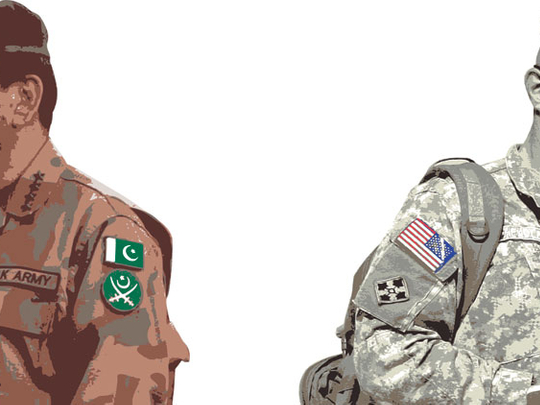
The US/Nato fighter plane and helicopter attacks on Pakistani border posts on November 26 resulting in 24 Pakistan Army soldiers being killed and others wounded has been the most serious of repeated violations of Pakistan's sovereignty and territorial integrity.
Resulting national anger led to the Government's decisions to: block Nato supply routes to Afghanistan; ordering the closure of Shamsi airbase used for CIA drone strikes; boycotting the Bonn Conference on Afghanistan; review all existing political, military and intelligence cooperation with America, Nato and by extension with Afghanistan. That country has become a launching pad for intervention by American and Nato forces, India and by Pakistani Taliban given sanctuary in training camps.
What are the implications of this development and how it should be addressed? Since the mid-1950s, America, despite ups and downs in the relationship, has provided significant political support, economic and military assistance to Pakistan. However, America has to figure out why it is so unpopular. Not that this is different than elsewhere in the Muslim world due to American support for Israel's occupation of Palestine.
Pakistanis believe that they are used, when in America's interest as during the Afghan jihad against Soviet occupation, and discarded when no longer needed. The American-Nato invasion and occupation of Afghanistan increased public hostility and rising extremism and terrorism resulting in 50,000 military and civilian fatalities. Making India a new American strategic partner accentuated by the US-India nuclear deal and ignoring the need to resolve the Kashmir dispute accentuated this trend. While it's being projected that the transit blockage, and Pakistan's absence at the Bonn Conference, is not serious, the reality is different. The percentage of supplies including fuel transiting Pakistan vary between 43 per cent to 50 per cent. If the air bridge was also closed, which will be done if there is any repeat of such an attack, the situation for American/Nato/Isaf forces in an Afghanistan they are retreating from will be far more serious. The Istanbul/Bonn process leading to the Nato summit is an attempt by the West to exit Afghanistan, while maintaining a key footprint. Without Pakistan's active involvement the future of Afghanistan remains bleak. It would be wise if the Karzai government which blows hot and cold on Pakistan, keeps this in mind.
Stability implications
No doubt strained relations with America will have costs for Pakistan. On the economic side its planners have assessed that it will be bearable although more effective mechanisms for raising finances will have to be deployed. On the military side, such curtailment will significantly affect operations along the Afghan border, which would not be in America's interests either.
If Pakistan were destabilised the international implications would be profound. It is wrongly held that Pakistan is a hot bed of terrorism and extremism. In fact these forces, such as that of Al Qaida, whose ideological wellsprings, its financing, and main planners are based in, or come from other Muslim countries and societies, where their hosts find it safer to divert such forces to Pakistan. If Pakistan faltered, the forces of extremism would exponentially expand not only in neighbouring India with its 150 million Muslim population, in the other Muslim countries where despite the Arab Spring the situation remains volatile but also in the large diaspora of some 40 million Muslims in the West. Both Pakistan and America have shared objectives, which include fostering democracy, good governance, countering terrorism and extremism, educational, social and economic development leading to prosperity. It is at the operational level where the policy of the political leadership has to be implemented that in both countries there is a certain disconnect at the military and intelligence levels. This latest attack, coming hours after Coalition Commander General John R. Allen met Pakistan Army Chief Ashfaq Kiyani demonstrates this disconnect.
Was Nato not aware of the implications of the first attack followed shortly afterwards by the second attack? Pakistan's perception is that they were deliberate to make a point. America never attempted such an action from Iraq against a hostile Iran, but takes Pakistan for granted.
To address this situation, both sides should lower the rhetoric, only possible after an early public apology is extended. Subsequent diplomatic negotiations require a readiness to seriously consider probable Pakistani demands.
First of all, ironclad guarantees against any further such attacks on Pakistani soil. Secondly, Pakistan's legitimate interests in a neutral Afghanistan must be recognised. Thirdly, winding down the drone strikes as the collateral public perception damage outweighs counter terrorism gains. Fourthly renegotiation of Nato/Isaf transit factoring in infrastructural costs. Labelling the relationship as transactional where Pakistan's self-respect and the lives of its soldiers and civilians are of less value than their western counterparts will be a grave mistake for America to make.
Ambassador Tariq Osman Hyder is a retired Pakistani diplomat.







